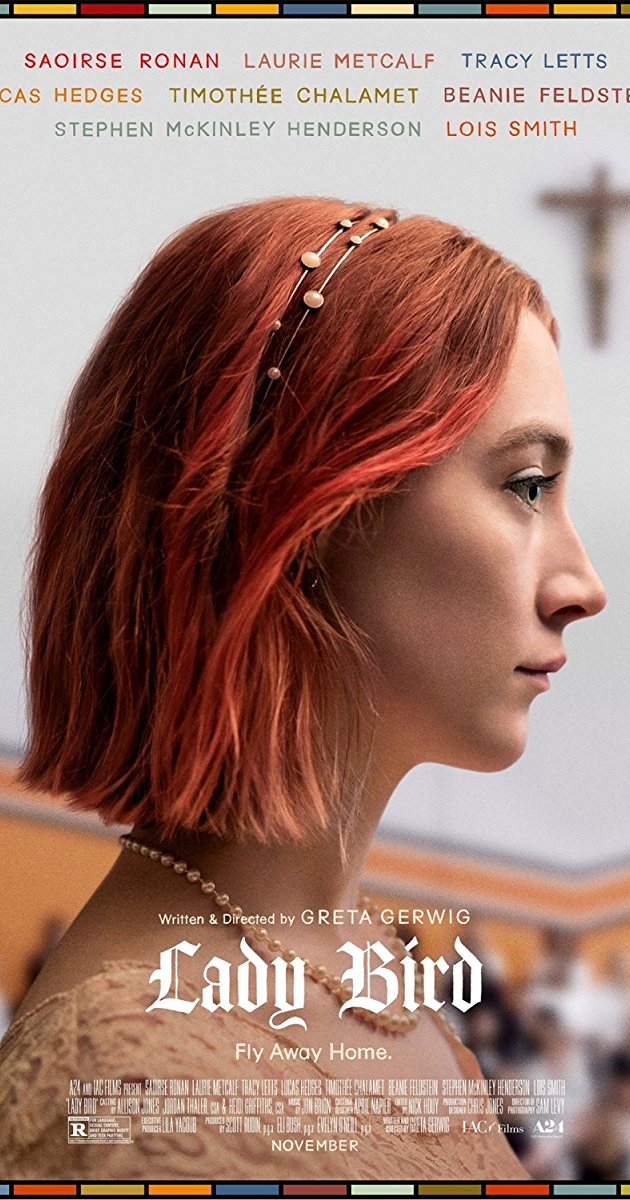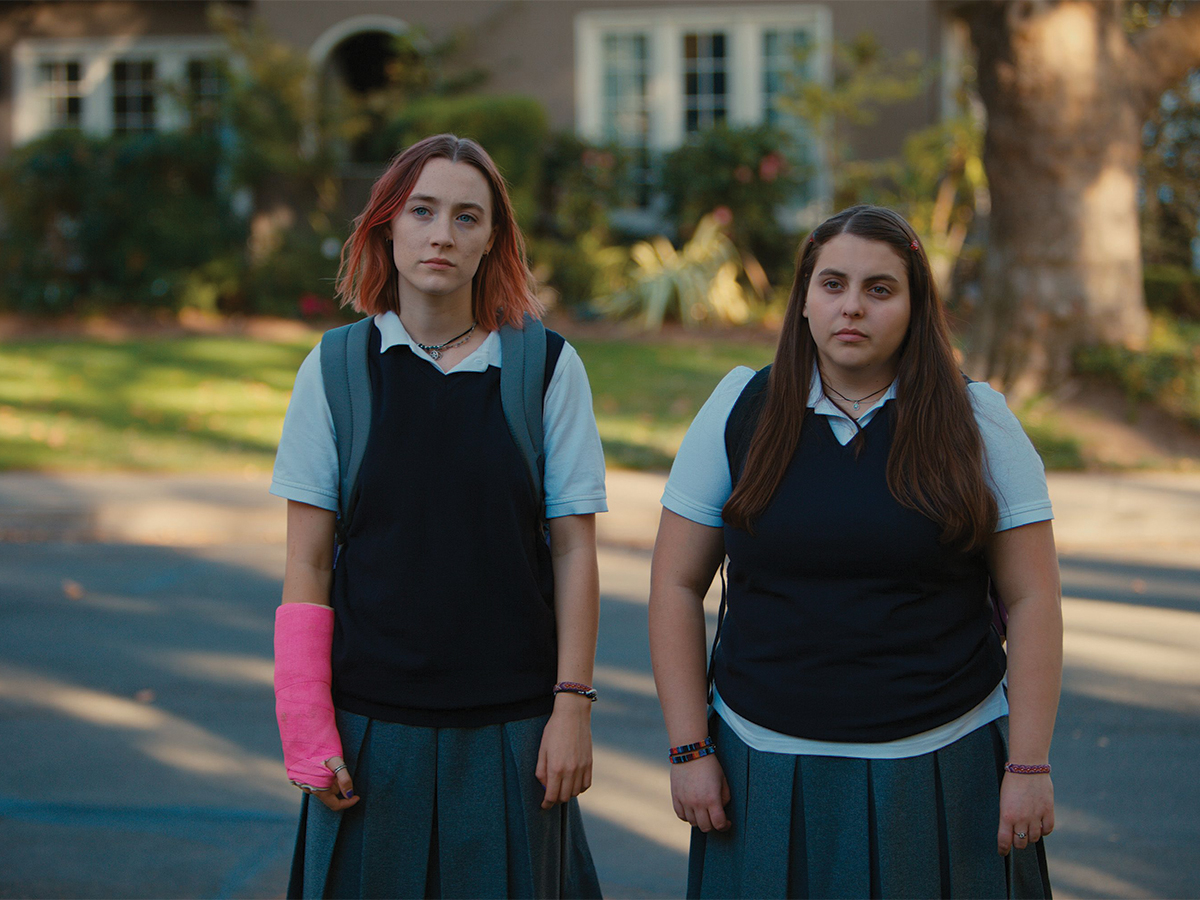
Remember all those petty arguments you had with your mom growing up? She’d get angry at you for something you’d swear you’re not guilty of, or maybe you’d be angry at her for something she did. In the moment, the point of contention never seemed petty though, and oftentimes someone will say — or do — something they come to regret. “If she loved me she wouldn’t treat me like this,” you’d rationalize, but only in hindsight are truths illuminated. The same can be said for much of our own coming of age, and in her directorial debut, Greta Gerwig is wonderfully perceptive in her observations on adolescence.
On paper, “Lady Bird” doesn’t read like Gerwig is in the business of reinventing the wheel steering the coming-of-age film genre — partly because it doesn’t, but also because she has no aims to.
Dissatisfied with the name assigned to her at birth, Christine (Saoirse Ronan in another home run performance following “The Grand Budapest Hotel” and “Brooklyn”) adopts the moniker of “Lady Bird” (her given name, she says: “Given to me, by me”) in the throes of teenage angst. She’s a senior in the 2003 graduating class at Catholic school Immaculate Heart (“Immaculate Fart,” she scoffs), where six inches are spared for the Holy Ghost at school dances and where awkwardly staged abortion assemblies are par for the course. We’re reminded this is 2003 when Lady Bird cries to Dave Matthews Band and stares uninterestedly at news footage of shock and awe tactics in Iraq.
She’s got something of a performative streak, too, something which she probably owes to her desire to “live through something” and escape her hometown of Sacramento to attend college in the east coast, “where there’s culture.” It’s this nature that compels her to join the school’s drama club alongside her best friend Julie (Beanie Feldstein), where she swoons over theater boy Danny (Lucas Hedges), a character with his own set of internal tribulations. At home, her relationship with her mother Marion (played with precision by Laurie Metcalf) is volatile at best, with fleeting displays of the type of harmony found in the closest of friends.
“Lady Bird” deceptively maneuvers around genre tropes with effortless humor and heartfelt tact, a talent Gerwig has mastered as an actor and is now mastering as a writer and director. Ronan’s comedy chops beget a spectacle of highlights, from a spent sigh of relief after crying to an audio reading of “Grapes of Wrath” with her mom to adopting the hilariously cringe-inducing slang of pretentious rich kid Kyle (Timothee Chalamet). Running just under 100 minutes, “Lady Bird” is a certified goldmine of quotes and delightful moments flavored with droll and whimsical humor.
For a genre so instilled with banality that it’s often garnished with gimmicks to evoke an artificial feeling of singularity, the blooming development “Lady Bird’”s title character plays like a rapturous celebration of adolescence. Lady Bird is self-assured, brazen and a little bit out of touch with the reality of most of the situations she finds herself in. But she’s never a caricature, and Gerwig never looks down upon her (or any of the film’s characters) for her dedication to some sense of individuality; she’s the star of her own movie in our world, and lives her own life assuming she’s the Julia Stiles of her own movie. The only obstacles preventing her from actualizing this romanticized version of herself, ironically, are the two most important factors in her life.
There’s a saying, maybe you’ve heard of it: You never know what you have until it’s gone. It’s cliche, yes, but it’s a truism that resonates profoundly in “Lady Bird.” The screenplay borrows aspects of Gerwig’s own upbringing in that she, like Lady Bird, went to Catholic school in Sacramento and was involved with theater. A strained relationship with their mothers also links the two, and it’s a connection that beautifully unfolds as the film reaches its end. Metcalf’s grounded performance lends an extra emotional potency that accents Lady Bird and Marion’s precarious dynamic, which ranges from frivolously passive aggressive to resentful.
It would be remiss not to discuss the attention to humanizing the characters of “Lady Bird” without noting how warmly Gerwig chooses to capture the city of Sacramento as well: City landmarks like Tower Bridge, Gunther’s Ice Cream Shop and Crest Theatre gleam in the night light, while niche local spots like Fabulous Forties neighborhood and McKinley Rose Garden are captured with a tangible love for the environments. In spite of Lady Bird’s resentment for the home she vexingly dubs the “Midwest of California,” Sister Sarah Joan (Lois Smith) is keen on the latent tenderness she has for the city. “Don’t you think they are the same thing?” she asks a confused Lady Bird, whose personal statement reflects on her life in Sacramento with acute attention, “love and attention?” It’s an unassuming scene of understated revelation where a line of dialogue reveals layers beneath the film’s angst ridden plot.
Verdict: Greta Gerwig offers a unique perspective on coming-of-age that adeptly blends maladroit claims at identity juggling with sincere human drama. “Lady Bird” is funny and insightful in a way that doesn’t feel like it’s trying to be either, merely a result of its creator’s wit; it’s a blissfully organic cohesion of style and engaging narrative that bodes well for Gerwig’s future as a writer and director.








